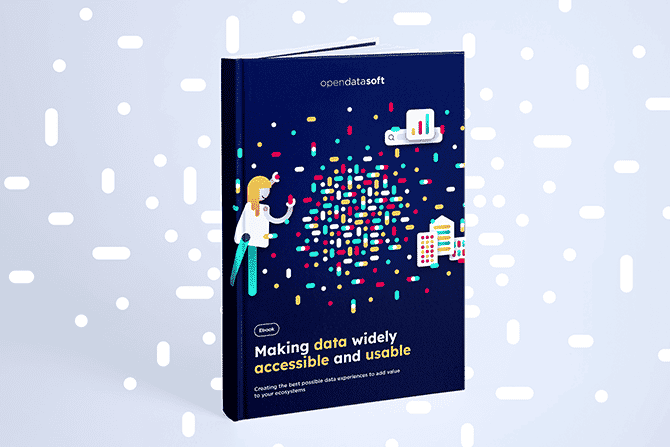Ebook: Democratizing data access and use
We can all easily access, create and share photos, messages, and videos every day. Yet we can’t simply access and consume data in the same way. Increasing data access and making it available for everyone to use therefore provides a real opportunity to increase value.

Create the best data experiences and generate value across your ecosystem.
We can all easily access, create and share photos, messages, and videos every day. Yet we can’t simply access and consume data in the same way. Increasing data access and making it available for everyone to use therefore provides a real opportunity to increase value.
Democratizing data means allowing organizations, employees and individuals to effortlessly access reliable – data-driven – information, at any time, without needing technical skills.
The goal of data democratization is to make data fully accessible and understandable, to promote its reuse and to allow everyone to have a straightforward, immediate and memorable data experience, just like every other type of content.
Discover our new ebook and learn all about data democratization:
- key issues and benefits,
- approaches to follow to start implementing your data projects
- examples of use cases from our customers: Bloomberg Associates, BPCE, Kering, Lamie mutuelle, North Carolina Office of State Budget and Management, Schneider Electric, SFR, SNCF, UK Power Networks, and Western Parkland Councils.
- advice from data experts: Databricks, Informatica, the Open Data Institute and Accenture.
Data reuse: information is still largely untapped by organizations
Organizations understand how data can be used to improve internal efficiency and decision-making, create new services, and generate additional revenue. It enables better communication and allows organizations to build engaging, long-term relationships with internal and external stakeholders, based on transparency and trust.
In our latest study, data leaders identified multiple benefits from better use of their data: including higher internal efficiency, improved decision-making, increased competitiveness, enhanced innovation, and greater transparency.
However, just 50% of organizations are actually engaged in projects to better exploit and use their data.
This is because organizations face a number of challenges to data reuse:
- Users are unaware of data’s potential;
- Data is siloed within departments inside organizations;
- Data remains the property of experts.
How can you address these challenges and implement a strategy to better use data across your organization? Download our ebook to find out.
How can you democratize data in your organization?
How do you start a project to better use your data? What are the most important factors you need to know, and how can you make the right choices when it comes to technology and structure?
You need to considered multiple areas when democratizing data in your organization:
Technological issues: how can you make data available to all your stakeholders, internally and externally?
Organizational issues: how can you establish a governance strategy and become a data-driven organization?
Cultural issues: how can you create and promote a data culture inside your business?
Featuring expert insights from Accenture, Informatica and Databricks, our new ebook answers all of your data democratization questions.
Democratizing data - use cases and benefits.
Data democratization impacts everyone. Through data, employees make better decisions, partners are more engaged, citizens have a better understanding of public services and how public bodies are performing, while consumers are able to engage more deeply with brands.
In order to achieve success, organizations must:
- Make data easily available to all internal employees, not just data experts;
- Offer their data “As a Service” via data services to support their ecosystems;
- Set up data portals which are open to the general public to better inform, communicate, and engage external stakeholders.
In our ebook, you’ll find a selection of relevant case studies from our customers: Bloomberg Associates, BPCE, Kering, Lamie mutuelle, North Carolina Office of State Budget and Management, Schneider Electric, SFR, SNCF, UK Power Networks, and Western Parkland Councils.




